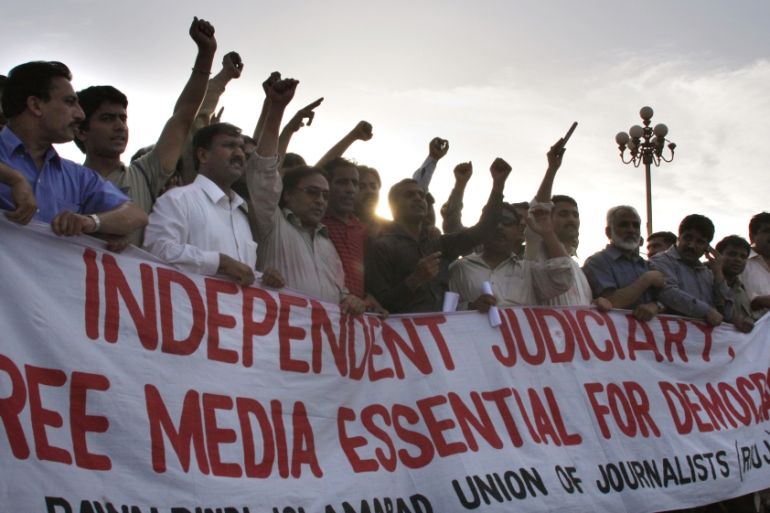Pakistan military ‘quietly’ stifling press with intimidation
Press freedom group says media outlets are being forced to self-censor including through violence against reporters.

Freedom of the press is under threat in Pakistan where its powerful military has used fear, intimidation and even violence to push journalists into self-censorship, a media rights group said.
A report by the Committee to Protect Journalists (CPJ) released on Wednesday said the Pakistani army has “quietly but effectively set restrictions on reporting” by establishing “lines of control” to gag the media.
Keep reading
list of 4 itemsIndia top court bails NewsClick editor arrested in Chinese funding case
Australian war crimes whistleblower David McBride jailed for six years
Tunisian lawyer arrested during live news report
The strategy includes “barring access to regions … encouraging self-censorship through direct and indirect methods of intimidation, including … allegedly instigating violence against reporters”, CPJ said.
“Privately, senior editors and journalists say the conditions for the free press are as bad as when the country was under military dictatorship, and journalists were flogged and newspapers forced to close.”
The military, Pakistan’s most powerful institution, routinely denies interference in politics or with the media.
While the army has not responded to the report, Pakistan’s Information Minister Fawad Chaudhry said the government has not received any complaints of intimidation from journalists.
‘Controlling narrative’
For its report, CPJ spoke to journalists and media organisations, including Geo News, Pakistan’s most popular television news channel, and the English-language newspaper Dawn.
The report said cable distributors had stopped distributing Geo’s programmes, cutting off about 80 percent of Pakistan’s households ahead of general elections.
Reuters news agency reported that at least two sources at Geo News said in April the army asked them to refrain from reporting on alleged military involvement in the incarceration of former Prime Minister Nawaz Sharif, who was removed from office in July 2017 by Pakistan’s Supreme Court.
Similarly, the editor of Dawn said the circulation of the newspaper was blocked in several places at the behest of the military.
“They’re clearly not happy with Dawn’s policies. They want Dawn to stay away from certain subjects,” its editor Zaffar Abbas said.
The CPJ report said a journalist was beaten in a brazen attack in the capital Islamabad, while another alleged he was assaulted by members of the security forces in civilian clothing in the southern city of Karachi.
“The mindset [of the military] now is to control the total narrative and reduce the diversity of opinion, so anything that is going against their narrative, they see as a threat,” a director at a news broadcaster said.
Indirect pressure
The CPJ report said the army, intelligence service or groups with ties to the military were linked to half of the 22 killings of journalists in the past decade in Pakistan.
While that number is on a decline, the report adds that the military has found indirect ways of intimidation.
“People in the military and sometimes in government have discovered that there are indirect ways of putting influence on the press,” said CPJ Asia coordinator Steven Butler, who wrote the report, citing unexplained abductions and assaults as examples.
The report comes out after the general election, in which the victory of former cricket hero Imran Khan triggered widespread allegations of the Pakistani army fixing the vote.
Some of Pakistan’s biggest media outlets had alleged they were pressured to tilt their coverage towards Khan during the campaign, an accusation the military denied.